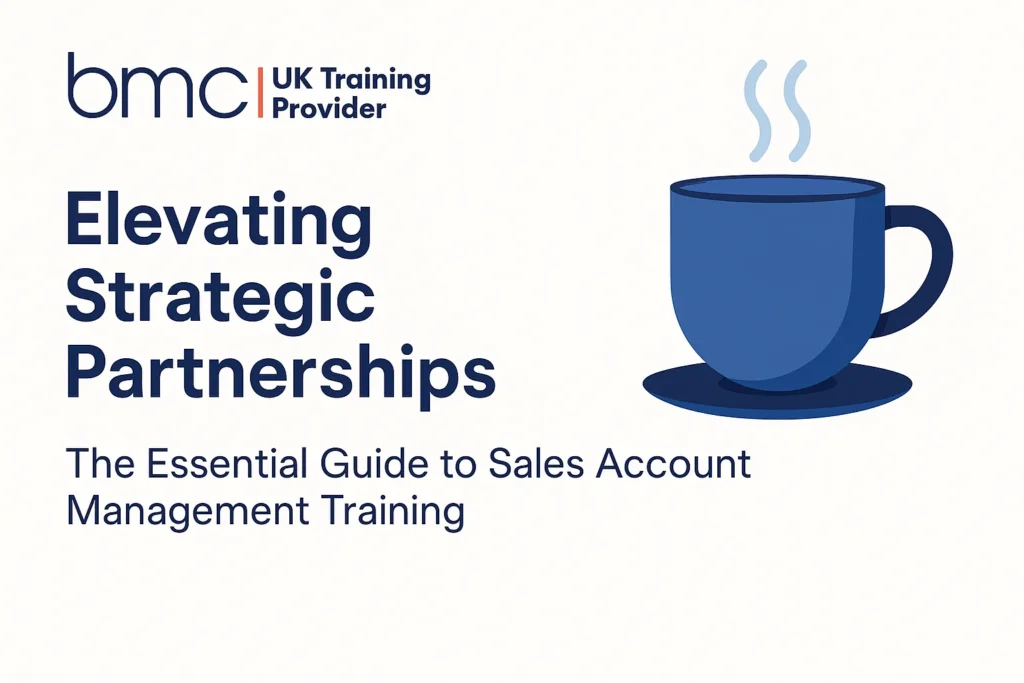In the realm of advanced business strategy, sustained growth is not solely about acquiring new clients, but about maximizing the value of existing relationships. For those interested in rigorous management development, focused sales account management training is the strategic pathway to achieving this. This specialized training converts transactional salespeople into strategic consultants, securing long-term revenue streams and fostering predictable business expansion.
A dedicated program in sales account management training is crucial for professionals aiming to excel in modern client relations. It offers a structured framework for managing complex accounts and ensuring client retention.
-
How it benefits managers: It equips administrative leaders with the knowledge to build durable client portfolios, moving beyond short-term sales goals to long-term financial stability.
-
Its relation to professional development: It is a key factor in career progression, certifying expertise in complex client relationship management and strategic thinking.
-
Its importance in modern training: It represents the pinnacle of modern sales education, prioritizing partnership development over pure volume.
What Is Sales Account Management Training?
Sales account management training is a comprehensive educational discipline designed to master the art of client retention and growth. It focuses on the strategic nurturing of key accounts that contribute significantly to the company’s revenue.
The training provides an in-depth understanding of the client’s business, its challenges, and its long-term objectives. It helps managers shift their focus from product selling to solution architecting.
For example, a scenario often explored in sales account management training involves a global firm selling complex ERP software. The account manager’s role is not the initial installation, but overseeing years of service, upgrades, and ensuring the software continually delivers demonstrable ROI to the client’s executive suite.
Read Also : Mastering the Bottom Line: A Comprehensive Guide to the Definition of Financial Acumen
Why Is Sales Account Management Training Important?
The critical importance of strategic sales account management training is reflected in tangible business outcomes and enhanced professional capabilities. Investing in this area directly impacts profitability and market positioning.
-
Improving Performance: Account managers with specialized sales account management training achieve higher retention rates and significantly increase the total revenue generated from existing clients through cross-selling and up-selling.
-
Supporting Decision-Making: The training sharpens strategic thinking, allowing managers to anticipate client needs and make proactive decisions that strengthen the partnership, rather than reacting to problems.
-
Raising Training Efficiency: By standardizing best practices in account planning and executive-level communication, this training elevates the overall competency of the sales organization, making future training more targeted and effective.
Read Also : What are the Responsibilities of Assistant Manager? A Definitive Guide
How to Apply Sales Account Management Training Effectively
Step-by-Step Process
The effective application of principles learned in sales account management training is methodical and strategic. This process ensures predictable growth within your key accounts.
-
Account Segmentation: Classify your accounts based on strategic importance, revenue potential, and complexity of needs (e.g., Tier A, B, C).
-
Strategic Account Planning: Develop a detailed, multi-year plan for each key account, mapping the client’s organizational structure and identifying key growth opportunities.
-
Conduct Quarterly Business Reviews (QBRs): Present value delivered and strategically align your roadmap with the client’s executive goals, utilizing skills honed in sales account management training.
-
Relationship Mapping and Expansion: Continuously build and nurture relationships across multiple departments within the client organization to ensure account stability.
Tools and Methods
Successful application of sales account management training relies on the disciplined use of specific strategic tools and refined communication methods.
-
CRM Systems: Essential for tracking all touchpoints, monitoring progress against the strategic plan, and accurate revenue forecasting.
-
Value-Based Communication: Shifting the conversation from product features to the quantifiable financial and operational impact (ROI) you deliver to the client.
-
Power Mapping: A strategic diagramming tool used to visually chart the key decision-makers and influencers within the client’s hierarchy.
-
Negotiation Frameworks: Using established negotiation models taught in sales account management training to secure mutually beneficial long-term contracts and renewals.

When Should You Use Sales Account Management Training?
This focused management approach is best suited for scenarios where relationship complexity and potential revenue justify the high level of investment required.
It is the best time to use this training when:
-
Accounts are Strategic: The client represents a significant percentage of annual revenue or holds high influence in the market.
-
The Solution is Complex: Your product/service requires extensive integration, customization, or ongoing consultation (e.g., cloud services, industrial equipment).
-
The Contract is Long-Term: The relationship is based on multi-year contracts and requires periodic, high-stakes renewals.
Cases to avoid using the full account management framework include:
-
Low-value, one-time, transactional sales with minimal need for ongoing service or relationship nurturing.
Key Differences and Comparisons in Sales Account Management Training
It is important to clearly distinguish this discipline from general sales activities, a core focus of rigorous sales account management training.
Comparison Table
| Feature | Account Management (Retention) | General Sales (Acquisition) |
| Primary Focus | Maximizing Customer Lifetime Value (CLV) | Closing new deals and generating leads |
| Relationship Scope | Strategic, deep, multi-level partnership | Transactional, often single point-of-contact |
| Skill Emphasis | Planning, Negotiation, Internal Advocacy | Prospecting, Pitching, Objection Handling |
Practical Examples
Consider a marketing agency. A general sales rep closes a contract for a single-channel campaign. An account manager, leveraging their sales account management training, then steps in to turn that contract into a multi-year partnership covering all digital channels, providing quarterly strategic reviews, and consistently demonstrating increased market share to the client’s CEO. This partnership approach ensures revenue protection and expansion.
Read Also : The Indispensable Role: Complete Guide to the Responsibilities of an Assistant Manager
Practical Tips for Mastering Sales Account Management Training
To transition from a good account manager to an expert, integrate these advanced practices into your strategy following your sales account management training.
-
Avoid the Common Mistake: Never focus your meeting agenda solely on selling a new product. Instead, focus 80% of the time on the client’s business problems and market position.
-
Best Practice: Multi-Threaded Relationships: Always strive to have trusted contacts across at least three different departments or levels within the client organization to prevent single points of failure.
-
Advanced Strategy: Internal Champion Development: Identify and equip an individual within the client organization to advocate for your services and internal projects when you are not present.
Frequently Asked Questions About Sales Account Management Training
What is the objective of strategic sales account management training?
The objective is to equip professionals with the skills to retain and grow high-value client accounts, ensuring predictable, long-term revenue streams.
How does account management differ from business development?
Business development focuses on identifying new markets and partnerships, whereas account management focuses on maximizing the potential of existing client relationships.
What is the role of the Strategic Account Plan?
It serves as a comprehensive blueprint detailing the client’s organization, challenges, opportunities, and the specific actions needed to secure partnership growth.
Is account management training necessary for small businesses?
Yes, it is vital for any business whose revenue is heavily reliant on a few key, large clients, regardless of the overall company size.
What is relationship mapping?
It is the process of documenting the names, roles, and influence levels of all key contacts within a client organization, a critical component of sales account management training.
How often should an account manager forecast revenue?
Revenue forecasting for key accounts should be done monthly, utilizing the data gathered through continuous strategic reviews and client health checks.
What key skill is emphasized in modern sales account management training?
The ability to consult with executive-level contacts and present business value in financial terms, rather than simply presenting product features.
Final Thoughts on Sales Account Management Training
Success in modern business management is defined by the ability to manage complexity, build trust, and secure lasting partnerships. Dedicated sales account management training is the vehicle for acquiring these high-value skills. It is an investment that transforms a manager’s approach, guaranteeing that client relationships become protected, strategic assets rather than vulnerable, one-off transactions. For any professional committed to continuous improvement and organizational growth, mastering the principles of sales account management training is a non-negotiable step toward leadership excellence.
About BMC Training
BMC Training is a premier international provider of comprehensive Management and Leadership Courses, focused on developing the next generation of business experts. We offer a distinguished catalog of programs, including specialized tracks like sales account management training, alongside courses in project management, business strategy, and financial leadership. What makes BMC Training the preferred choice is our commitment to industry-recognized certification and delivering practical, actionable knowledge from experienced experts. To enhance your team’s capabilities or secure your own professional certification, explore our course catalogue today. Contact us via our website to reserve your spot and invest in the strategic skills that drive long-term business success.


